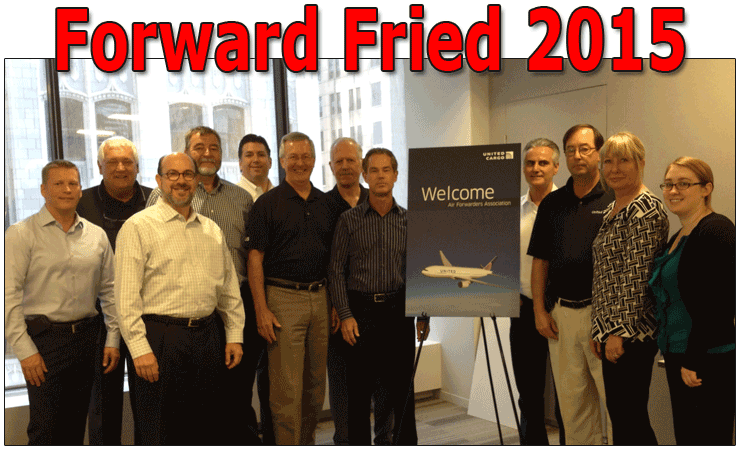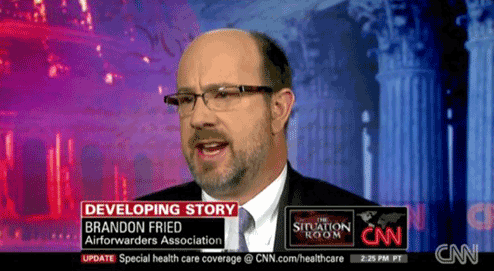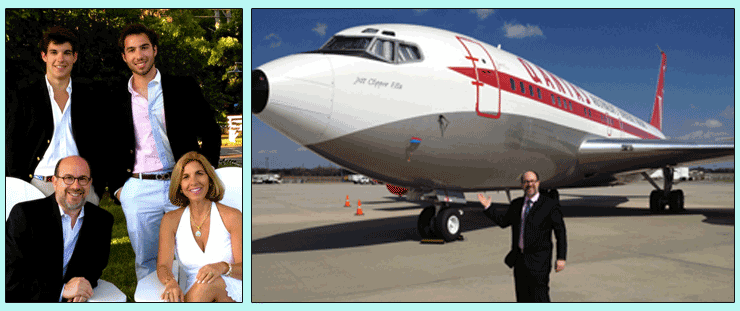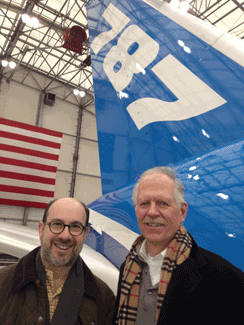 AfA
Board Of Directors at UA headquarters in Chicago. AfA
Board Of Directors at UA headquarters in Chicago.
You may not know much
about the Air Forwarders Association (AfA), but certainly almost everybody
knows of the group’s president, Brandon Fried.
Brandon Fried seems to be everywhere and
can be considered amongst the longest-lasting opinion makers in the air
cargo industry; he is easily the most vocal and well-known forwarder anywhere.
 Of all the associations (and people operating
them) out there, the one absolutely vital link in the chain are the freight
forwarders.
Of all the associations (and people operating
them) out there, the one absolutely vital link in the chain are the freight
forwarders.
Into the equation comes this rather compact
and busy man who can most often be found either up on Capitol Hill, a
short distance from his office in Washington, D.C., or writing a guest
editorial defending an association or the forwarders’ point of view.
Brandon can also be found conducting sessions
at any one—or seemingly all of—the trade shows.
Brandon Fried is always out there at one
air cargo club after another, delivering a keynote or pushing his or the
industry’s agenda at monthly meetings in Atlanta, New York, or east
Timbuktu.
Brandon Fried, like the weather, is always
there.
The idea that you can “lift air cargo
everywhere, almost all at once” is wonderfully quixotic, and there
is no one else who does it better than Brandon Fried.
So as 2015 begins, Brandon makes the case,
and as usual the esteemed Mr. Fried is not at a loss for words.
FT: What
is the main focus of the AfA March 6 New Orleans Annual Event and what
does the AfA and its members in general view as the major challenges in
2015?
BF:
It’s really the one time of the year
that the air forwarding industry gets together – and it’s
the one opportunity that forwarders have to network with a large cross-section
of their industry colleagues, learn what others are doing and get a good
snapshot of where the industry is going. We put a premium on learning
and education, and anyone who attends is going to come out of it with
a boost in their knowledge and their contacts. I am a believer in the
proposition that for a forwarding business to be successful, sticking
to your knitting is important but you also have to have a good deal of
industry awareness, and this event is a good way to get that.
As for as the major challenges, in a nutshell
I would say that our agenda will focus on upcoming advanced data regulations,
e-commerce, technology, upcoming new export and import regulations, legal
concerns and of course, a new update to the TSA security program for forwarders.
FT: Are
you satisfied with progress on e-AWB and the continued integration of
paperless cargo? Where do you expect your membership to be at the close
of business in 2015 in terms of implementation? Any suggestions as to
how the industry can advance or accelerate that process?
BF:
No, I’m not satisfied yet. While the
concept is sound and while we wholeheartedly share the overall goal, the
various actors in air cargo simply have to get past the finger pointing
and sit down together and develop sound solutions that can work for all
the players regardless of size. One size does not fit all and forwarders
come in all shapes, sizes and with varying degrees of financial resources.
I am optimistic we can get to a level of productive dialogue, because
electronic document transmission adoption is an obvious and essential
component for air cargo’s future success as an industry. Our members
know it and look forward to working with their airline partners in harmonizing
messaging standards and protocols to expedite its implementation.
FT: Do
you think freight forwarders get enough respect? What are the most common
misunderstandings about the role of forwarders?
BF:
Respect? Are you kidding? The other day I
told my wife that everyone hates me. She said I was being ridiculous;
everyone hadn’t met me yet. Seriously though, for the most part,
I believe that yes, absolutely, forwarders get the respect they deserve.
Oh sure, there are always a few luddites who seem to think it’s
wise to blame their customers, the forwarders, for their own problems
and shortcomings. But in the main, most recognize the important role forwarders
play in increasingly complex and regulated supply chains. I feel they
know the value that we bring to the table and they trust us to deliver
that value.
FT: What
has AfA done for its membership during the past 12 months? Why should
a forwarding company join and also why should members be more active in
AfA?
BF:
An insider once told me that in Washington
politics, you are either at the table or you are on the table. So our
association has worked to make sure we are out in front of issues impacting
freight forwarders. Politicians will say anything and if you are not there
to provide a strong voice, they can legislate you out of business. For
instance, the governor of New York recently talked about a plan to revitalize
the three New York area airports and in so doing he indicated that it
would move passenger cargo operations to Stewart airport, 85 miles to
the north. Any forwarder who works in the New York City market and has
operations near JFK knows that’s not advisable or even workable.
And if they did try to do that we all know it would be devastating to
our businesses and to the metro area’s economy at large. But what
was needed was an organization to carry that message to the public and
to their representatives in government. And the AfA did that. We got our
message out. The prospects that we will be part of the eventual solution
to the miserable condition of New York City’s airports are higher
than they were before. We are engaging the governor’s office now
and will continue to do so until their plan is clarified.
Overall, when it comes to policy, we've
been more active this year than ever before, engaging in a wide range
of issues that affect our members. Given that our members are largely
multi-modal, we have followed the West Coast port labor slowdown, written
letters and joined efforts to convince the Obama administration to send
federal mediators to resolve the situation.
We’ve testified before Congress about
forwarders using privatized canines for cargo screening. In fact it was
largely due to our awareness raising efforts on Capitol Hill that the
hearing was even held.
We’ve also been active in monitoring
the constantly changing lithium battery regulatory issue. We’ve
weighed in on trucking rules, focused attention on highway infrastructure
funding, established best e-freight practices for forwarders, worked with
CBP in developing the advanced data screening initiative, and endorsed
trade liberalization agreements. It has been a busy year and we don’t
expect things to let up in 2015.
Let me give you a quick example of why it
is important for air forwarders to be a part of the AfA. Around mid-year,
we got word from a couple of our members that they had been notified that
the U.S. Census Bureau was planning to eliminate the Carnet exemption,
something that could impose a huge cost burden on freight forwarders who
facilitate temporary shipments that are intended to be removed from the
country they have recently entered - items like trade show goods, conference
supplies, museum displays and equipment for film, TV, sports and musical
tours.
We looked into it with our government relations
expert and found out that it was true – and, what’s more,
we got an indication that the Bureau didn’t really understand exactly
what it was doing or the harm this would cause. So we gathered up more
information from our members and worked with CBP's Office of Field Operations,
other stakeholders and Congressional staff to get the Bureau to reverse
course – and the exemption stayed in place. In an industry like
ours, you really have to have an association working on your behalf.
We also provide member education, not only
with an increasing amount of online course offerings, but an active webinar
schedule focusing on changing export regulations, employee compensation,
lithium battery rules, the electronic single window Presidential Executive
Order to name a few. AfA members receive frequent communication and consequently
are a sophisticated, well-informed group
FT: What
are some changes the forwarders would like to see in the air cargo business?
Suggest how together everyone might lift the industry even further?
BF:
More freight! Oh, and let’s rein in
the seemingly endless waves of new regulation. One new rule here and another
new rule there; the cumulative impact is really stifling the business
climate. For the rules that are on the books, or being seriously considered,
we need to work with government agencies, legislative bodies and multilateral
organizations in assuring that they are harmonized with other countries.
FT: What
does your membership tell you about the lot of women in cargo? How many
women-run businesses are members of AfA. Do you detect any fundamental
change in the industry to include an agenda such as the Delta-led initiative
at the annual AfA event?
BF:
Women are increasingly playing a leading role
in the freight forwarding industry and our association is reflective of
the trend. The AfA Board of Directors reflects this trend, as 40 percent
of our Directors, including the incoming President, are women.
While we do not specifically ask for gender
information when determining the ownership of our member companies, a
significant amount of leadership contacts are women and this has steadily
been increasing each year.
Also, our annual Women’s Networking
Event continues to increase in popularity each year and we are looking
forward to it again at AirCargo 2015 New Orleans.

“My favorite constituents,”
Brandon insists, Evan, Jordan and wife Kimberly Fried. Stayin’
Alive on the ATL tarmac with vintage B707 in earlier Qantas livery
that belongs to superstar John Travolta. |
FT: How
did you come to leadership at AfA? What is your background? What are you
most proud of in your work? How long have you been at AfA and how long
do you plan to continue?
BF:
As a kid I came to love anything airplane
or airline related, so working at an airfreight company in the summers
while in high school in Miami exposed me to the industry. After graduating
with a Public Policy degree from Syracuse University, I moved to Los Angeles
and learned the air cargo business while working for another freight forwarder
before moving to Washington. I then owned and operated a freight forwarding
company in the Washington DC area for 25 years before selling the business
and being invited to assume the executive directorship role of the AfA.
Since I was educated in regulatory and public
policy engagement, this background combined with my passion for the freight
forwarding industry made me ideally suited for my role within AfA. This
has been a great job that has allowed me to travel around the world, working
with a dynamic group of Board Directors and members who are as impassioned
about the business as I am. I began this job almost ten years ago and
look forward to continuing my work well into the future. I think our members
can sense how much fun I am having and that helps them feel good about
actively participating in association business and activities.
FT: If
you, Brandon Fried, could change a few things in air cargo like some kind
of genie what would those things be?
BF:
I would reduce the regulatory clutter that
has resulted in response to the security concerns arising out of the 9/11
attacks. So many rules were drafted before 100 percent physical screening
of cargo became law and many of those regulations are still on the books,
contributing little or nothing to security. Perhaps I would reframe the
debate over the known shipper requirement since all cargo is physically
screened before flying on passenger planes. This and other outdated rules
need to be reexamined as they continue to cost our members revenue and
business opportunities against other transport modes.
 FT:
Who do you admire? FT:
Who do you admire?
BF:
I have had the privilege of being around some
of the best and brightest people in the business and continue to learn
from their wisdom daily. I cannot name them all but people including AfA
Chairman Richard Fisher of Falcon Globaledge (pictured here inspecting
the Boeing 787 with Brandon), Jo Frigger of EMO Trans, Ray Curtis
of Delta Airlines, Matt Buckley of Southwest and Bruce Campbell from Forward
Air come to mind. Of course, the AfA Board members are a terrific group
of professionals and I admire them all.
But probably the individual I admire most
in the air cargo industry would be Fred Smith from FedEx. Aside from my
father, Fred Smith has always been a personal hero as his accomplishments
helped to create the market awareness and success our industry enjoys
today.
FT: Any
surprises in 2014? What is your view of the next few years ahead? How
can we all be more successful?
BF:
There were not too many surprises last year
but I fear that those ahead may be full of more unnecessary regulation
that could adversely impact our industry. TSA gets a new administrator
beginning in 2015 and we hope the risk-based approach to cargo security
continues. The new Congress could bring many challenges concerning important
areas in highway infrastructure funding, sort out air traffic control,
and lithium battery regulations to name a few. However, trade liberalization
agreements will hopefully get passed that will result in more cargo between
countries.
We can all be more successful by engaging
regulators to promote common sense laws, working with each other to advance
the electronic commerce initiative and pursuing industry education that
not only improves our performance but trains the new crop of logistics
professionals interested in becoming part of this vital industry.
Geoffrey |





